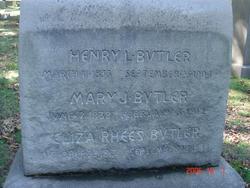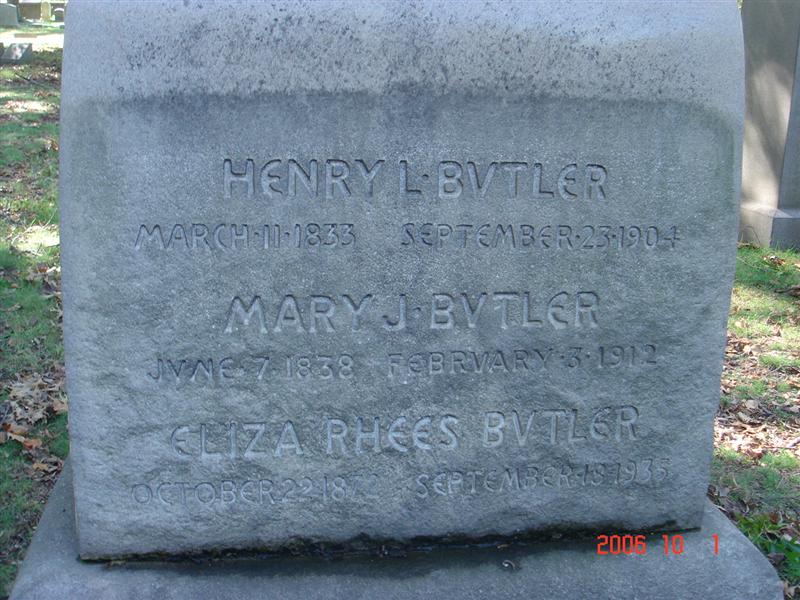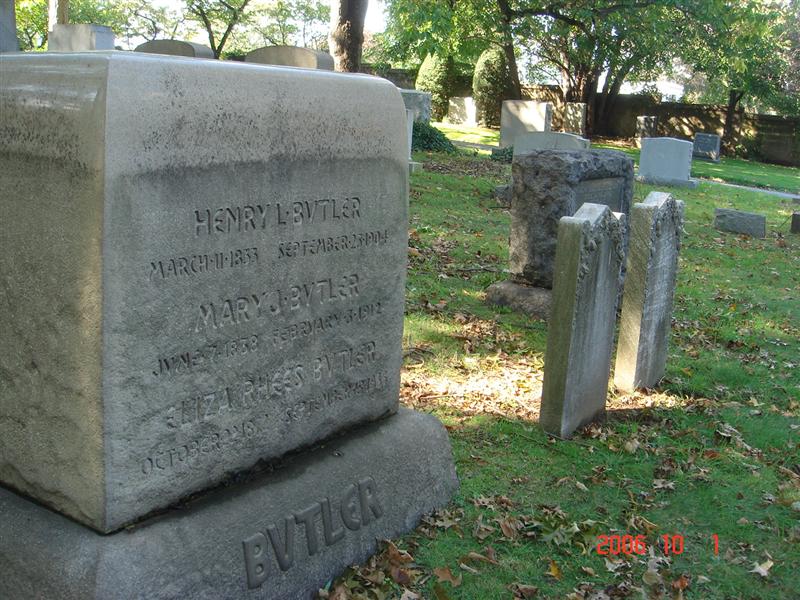Henry Leny Butler was buried in the Butler family plot on September 25, 1904.
************************************************************************************
OBITUARY, Paterson Daily Press, 9/23/1904.
FULL OF YEARS AND OF HONORS.
IN HIS OWN LIFE AND HIS PROGENY WAS THIS OUR TOWNSMAN DISTINGUISHED
OLD CITIZEN PASSES AWAY.
HENRY L. BUTLER DIED THIS MORNING AFTER LONG ILLNESS
BRIGHT AND USEFUL CAREER.
One of Paterson’s foremost citizens, Henry L. Butler, died at about half past seven o’clock this morning at his home, 175 Hamilton Avenue, after an illness of four weeks, due to a complication of stomach disorders. Previous to his last illness, Mr. Butler had been troubled with acute indigestion and the other complications followed. For several days he had lingered at death’s door and showed remarkable vitality due to a singularly robust constitution. Several times his death was expected momentarily, but he rallied slightly from time to time until the end came this morning.
Although he had led a retired life for several years past, Mr. Butler had always taken an active interest in the city’s welfare, and especially in its industrial and educational concerns. By his death, Paterson loses one of its brightest citizens and one who was highly respected and admired in all circles. Although so prominently identified with the city’s life, Mr. Butler was not a member of any society or lodge, and the only organization to which he belonged was the Hamilton Club, where he spent much of his leisure time while in health, talking with old friends about current topics of the day and matters which affected the city. Mr. Butler’s fund of general information was immense and his conversational powers of the highest order, so that he was always listened to with interest when he discussed the questions of political, municipal or general character upon which he delighted to dwell. Mr. Butler had of late taken a keen interest in the Japanese-Russian war, and he was one of the few who had studied the problems and operations of that struggle with the diligence and intelligence necessary to a clear understanding of the subject. The deceased was born in London on March 11, 1833. His father, who was an officer in the East India Company, died while Henry L. was an infant, and in 1835 he came to this country with his mother who took up her residence in New York City. There he received his early education and in 1844 the family removed to Paterson. Mr. Butler entered Burlington College N.J., founded by Bishop Duane, and graduated high in his class. His mother, believing that every man should know a trade, sent her son to work in the Rogers locomotive shops, where he was taught the calling of master mechanic. In 1854, he went into business, entered a large importing house in New York City, conducted by James T. White & Company. He remained there until 1857 and then began the manufacture of carpets and continued in that until he retired from active business. He resumed it, however, several years later when he operated a silk throwing plant for a while. For several years past, he had not been in active business life.
Mr. Butler was a member of the Board of Education several times in the late sixties and early seventies, and at the time of his retirement was the president of that body. He always took a deep interest in the educational interests of the city and was responsible for many improvements in the local schools, being very active in building up a school system. For nine years he was a member of the Board of State Prison Inspectors, and in 1885 he was elected Supervisor of the State Prison, holding that office for seven years with great results in the improvement of prison conditions and the establishment of the institution on sound business principles. In 1879, Mr. Butler was the Republican candidate for Mayor, but was defeated by Joseph R. Graham. He was also a delegate to the Republican National Convention in 1880, supporting James B. Blaine. He was nominated for Presidential Elector in 1884, but the Democrats carried the State in that election. Mr. Butler also held the office of Chairman of the Republican County Committee for a number of years with marked efficiency and was always actively interested in local and national politics.
The deceased leaves surviving him, besides his widow, three sons, Nicholas Murray, President of Columbia University; William C. and Henry M., and two daughters, Misses Elizabeth and Mary Butler.
Among Mr. Butler’s activities was a fondness for athletic sports. In his younger days and well past middle age he was an enthusiastic curler and member of the Ivanhoe Curling Club, in which he “skipped” many a rink.
Mr. Butler’s wife was a daughter of the Rev. Nicholas Murray, D.D., pastor of the First Presbyterian Church at Elizabeth from 1834 to his death in 1861. Dr. Murray became widely famous from an epistolary controversy which, under the signature of “Kirwan”, he had more than half a century ago with the Right Rev. John Hughes, Roman Catholic Bishop of New York.
The funeral will take place on Sunday afternoon at three o’clock from the Church of the Redeemer. The family has requested that no floral offering be sent.
Henry Leny Butler was buried in the Butler family plot on September 25, 1904.
************************************************************************************
OBITUARY, Paterson Daily Press, 9/23/1904.
FULL OF YEARS AND OF HONORS.
IN HIS OWN LIFE AND HIS PROGENY WAS THIS OUR TOWNSMAN DISTINGUISHED
OLD CITIZEN PASSES AWAY.
HENRY L. BUTLER DIED THIS MORNING AFTER LONG ILLNESS
BRIGHT AND USEFUL CAREER.
One of Paterson’s foremost citizens, Henry L. Butler, died at about half past seven o’clock this morning at his home, 175 Hamilton Avenue, after an illness of four weeks, due to a complication of stomach disorders. Previous to his last illness, Mr. Butler had been troubled with acute indigestion and the other complications followed. For several days he had lingered at death’s door and showed remarkable vitality due to a singularly robust constitution. Several times his death was expected momentarily, but he rallied slightly from time to time until the end came this morning.
Although he had led a retired life for several years past, Mr. Butler had always taken an active interest in the city’s welfare, and especially in its industrial and educational concerns. By his death, Paterson loses one of its brightest citizens and one who was highly respected and admired in all circles. Although so prominently identified with the city’s life, Mr. Butler was not a member of any society or lodge, and the only organization to which he belonged was the Hamilton Club, where he spent much of his leisure time while in health, talking with old friends about current topics of the day and matters which affected the city. Mr. Butler’s fund of general information was immense and his conversational powers of the highest order, so that he was always listened to with interest when he discussed the questions of political, municipal or general character upon which he delighted to dwell. Mr. Butler had of late taken a keen interest in the Japanese-Russian war, and he was one of the few who had studied the problems and operations of that struggle with the diligence and intelligence necessary to a clear understanding of the subject. The deceased was born in London on March 11, 1833. His father, who was an officer in the East India Company, died while Henry L. was an infant, and in 1835 he came to this country with his mother who took up her residence in New York City. There he received his early education and in 1844 the family removed to Paterson. Mr. Butler entered Burlington College N.J., founded by Bishop Duane, and graduated high in his class. His mother, believing that every man should know a trade, sent her son to work in the Rogers locomotive shops, where he was taught the calling of master mechanic. In 1854, he went into business, entered a large importing house in New York City, conducted by James T. White & Company. He remained there until 1857 and then began the manufacture of carpets and continued in that until he retired from active business. He resumed it, however, several years later when he operated a silk throwing plant for a while. For several years past, he had not been in active business life.
Mr. Butler was a member of the Board of Education several times in the late sixties and early seventies, and at the time of his retirement was the president of that body. He always took a deep interest in the educational interests of the city and was responsible for many improvements in the local schools, being very active in building up a school system. For nine years he was a member of the Board of State Prison Inspectors, and in 1885 he was elected Supervisor of the State Prison, holding that office for seven years with great results in the improvement of prison conditions and the establishment of the institution on sound business principles. In 1879, Mr. Butler was the Republican candidate for Mayor, but was defeated by Joseph R. Graham. He was also a delegate to the Republican National Convention in 1880, supporting James B. Blaine. He was nominated for Presidential Elector in 1884, but the Democrats carried the State in that election. Mr. Butler also held the office of Chairman of the Republican County Committee for a number of years with marked efficiency and was always actively interested in local and national politics.
The deceased leaves surviving him, besides his widow, three sons, Nicholas Murray, President of Columbia University; William C. and Henry M., and two daughters, Misses Elizabeth and Mary Butler.
Among Mr. Butler’s activities was a fondness for athletic sports. In his younger days and well past middle age he was an enthusiastic curler and member of the Ivanhoe Curling Club, in which he “skipped” many a rink.
Mr. Butler’s wife was a daughter of the Rev. Nicholas Murray, D.D., pastor of the First Presbyterian Church at Elizabeth from 1834 to his death in 1861. Dr. Murray became widely famous from an epistolary controversy which, under the signature of “Kirwan”, he had more than half a century ago with the Right Rev. John Hughes, Roman Catholic Bishop of New York.
The funeral will take place on Sunday afternoon at three o’clock from the Church of the Redeemer. The family has requested that no floral offering be sent.
Family Members
Sponsored by Ancestry
Advertisement
Records on Ancestry
Advertisement














